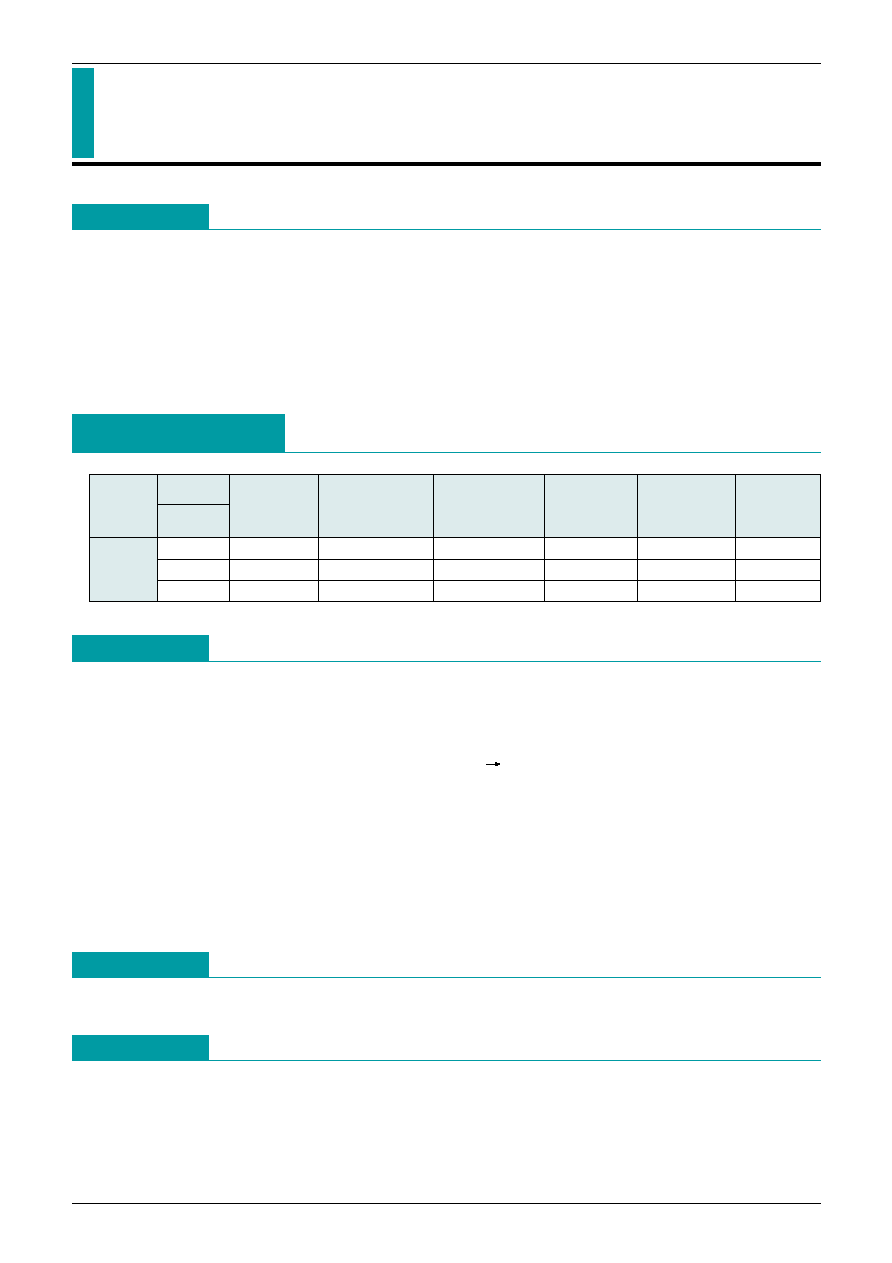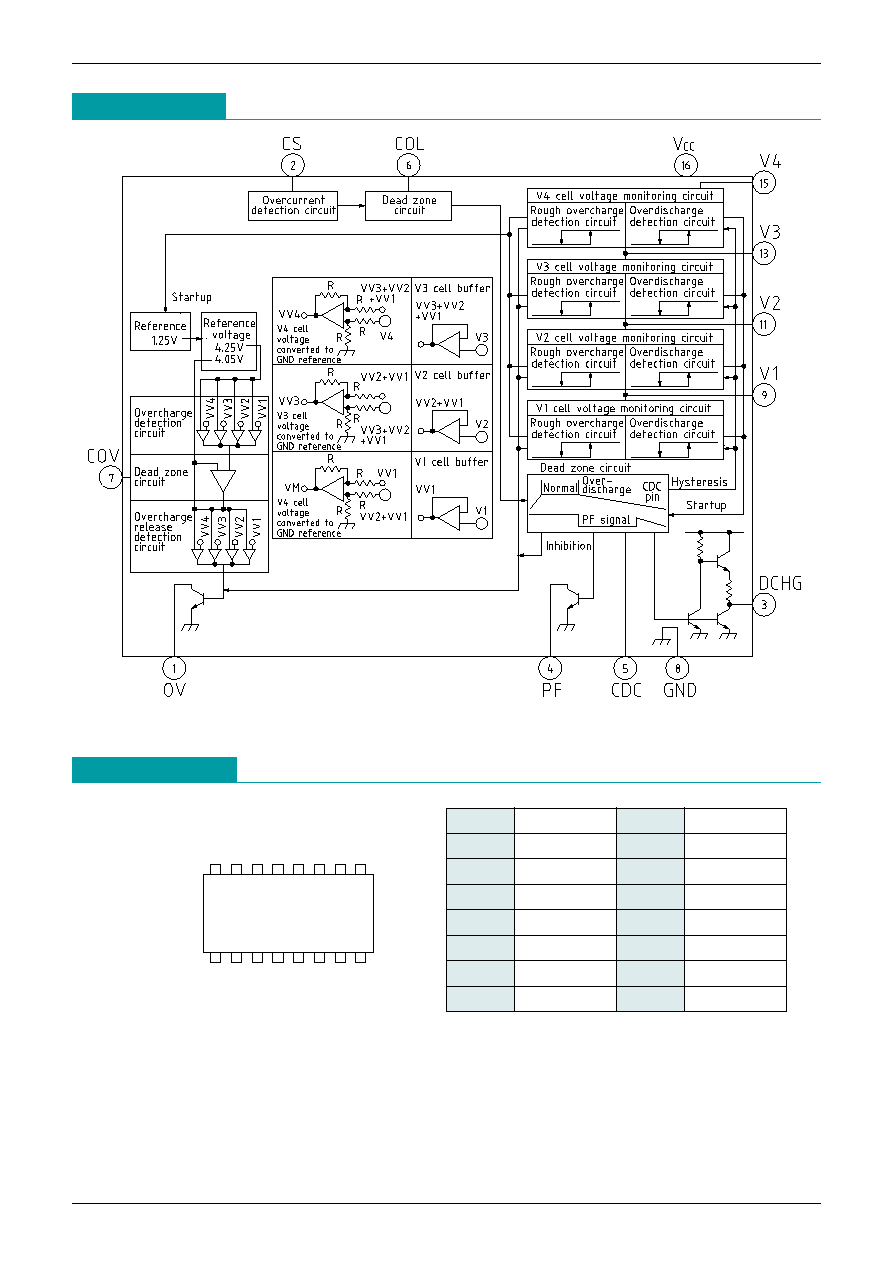 | –≠–ª–µ–∫—Ç—Ä–æ–Ω–Ω—ã–π –∫–æ–º–ø–æ–Ω–µ–Ω—Ç: MM1294B | –°–∫–∞—á–∞—Ç—å:  PDF PDF  ZIP ZIP |

MITSUMI
Protection of Lithium Ion Batteries (four cells in series) MM1294
Protection of Lithium Ion Batteries (four cells in series)
Monolithic IC MM1294
Outline
This IC provides protection for lithium ion batteries in the event of overcharging, overdischarging and
overcurrents. When anomalies occur during charging or at other times and excessive voltages are applied,
after a certain time has elapsed for each cell an external FET switch is turned off (overcharging detection); and
in order to prevent overdischarge of the battery during discharge, when the voltage of individual batteries falls
below a fixed voltage, an external FET switch is turned off (overdischarge detection), and the IC is put into
low-consumption current mode. When large currents flow due to a short-circuit or other cause, an external
MOS switch is turned off (overcurrent detection).
Package
SSOP-16
Features
1. Current consumption (overcharging)
V
CELL
> V
CELLU
170µA typ.
2. Current consumption (normal operation)
V
CELL
< V
ALM
35µA typ.
3. Current consumption (overdischarge)
V
CELL
< V
CELLS
0.1µA max.
4. Overcharge sensing dead time
C=0.1µF
1.0S typ.
5. Overcharge sensing operation voltage
V
CELL
: L H
A,G: 4.20V±150mV/CELL
B: 4.10V±150mV/CELL
6. Overdischarge sensing dead time
C=0.1µF
1.0S typ.
7. Overcurrent detection voltage
0.15V typ.
8. Overcurrent protection circuit
A, B; Load open 300k
or higher
G; charging reset
9. Overcharge and overdischarve voltages as well as the overcurrent detection voltage can be changed upon
request.
Applications
Lithium ion battery pack for notebook computers
4-Cell Protection ICs
Temperature conditions A: Ta=-25 ~ 75∞C, B: Ta=-20 ~ 70∞C, C: Ta=0 ~ 50∞C,
D: Ta=0 ~ 40∞C, E: Ta=-20 ~ 25∞C
Model
Package
SSOP-16
AJ
4.350±0.050
B
200±60
2.35±0.10
3.05±0.15
150±15
MM1294
BJ
4.250±0.050
B
200±60
2.40±0.10
3.10±0.15
150±15
GJ
4.350±0.050
B
200±60
2.35±0.10
3.05±0.15
150±15
Overcharge
detection
voltage (V)
Overcharge
detection voltage
temperature
conditions
Overcharge
detection
hysteresis
voltage (V)
Overdischarge
detection
voltage (V)
Overdischarge
reset
voltage (V)
Overcurrent
detection
voltage (mV)

MITSUMI
Protection of Lithium Ion Batteries (four cells in series) MM1294
Block Diagram
Pin Assignment
SSOP-16
1
3
7
6
2
4 5
8
16
13
11
15 14
12
9
10
1
OV
9
V1
2
CS
10
N.C
3
DCHG
11
V2
4
PF
12
N.C
5
CDC
13
V3
6
COL
14
N.C
7
COV
15
V4
8
GND
16
V
CC

MITSUMI
Protection of Lithium Ion Batteries (four cells in series) MM1294
Pin Description
Absolute Maximun Ratings
Pin no. Pin name
Input/
Function
output
1
OV
Output
2
CS
Input
3
DCHG
Output
4
PF
Output
5
CDC
Input
Pin to set the dead time for overdischarge detection
By connecting a capacitor between the CDC pin and GND, a dead time can be set.
6
COL
Input
7
COV
Input
Pin to set the dead time for overcharge detection
By connecting a capacitor between the COV pin and GND, a dead time can be set.
8
GND
Input
Ground pin
9
V1
Input
Pin for input of V1 cell high-side voltage and V2 cell low-side voltage
10
N.C
Non connected
11
V2
Input
Pin for input of V2 cell high-side voltage and V3 cell low-side voltage
12
N.C
Non connected
13
V3
Input
Pin for input of V3 cell high-side voltage and V4 cell low-side voltage
14
N.C
Non connected
15
V4
Input
Pin for input of V4 cell high-side voltage
16
V
CC
Input
Power supply input pin
The same potential as the V4 pin should be input
Overcharge detection output pin
NPN transistor open collector output; normally high impedance, goes to L level on
overdischarge
Overcurrent detection pin
Monitors equivalent load current through source-drain voltage drop of discharge-controlling
FET, and at or above the overcurrent detection voltage sets the DCHG pin to "H" and turns
off the discharge-controlling FET. Following overcurrent detection, current is passed from
this pin, and if the load is decreased, the overcurrent mode is canceled. Through this action
there is a temporary consumption current (at the V
CC
pin) of approx. 1 mA on resumption of
discharge and detection of overdischarge. This function is disabled in overdischarge mode.
Pin driving the discharge-controlling FET (P-ch)
Normally "L"; on overdischarge set to "H"
Output pin for overdischarge detection signals
Overdischarge detection signal output pin
When the overdischarge detector detects overdischarge at the open collector output
of the NPN transistor, this pin is turned on. A delay is provided by setting a dead
time until discharge ends, so that by utilizing a reset or other signal from a CPU or
some other controlling device, the equipment can be put into standby mode.
Pin to set the dead time for overcurrent detection
By connecting a capacitor between the COL pin and GND, a dead time can be set.
If NC, protection is triggered in a short amount of time; the dead time should be
set according to the application.
Item
Symbol
Ratings
Units
Storage temperature
T
STG
-40~+125
∞C
Operating temperature
T
OPR
-20~+70
∞C
Charge voltage
VV4 max.
24
V
Power supply voltage
V
CC
max.
24
V
Voltage applied to OV pin
V
OV
max.
24
V
Allowable loss
Pd
300
mW

MITSUMI
Protection of Lithium Ion Batteries (four cells in series) MM1294
Recommended Operating Conditions
Electrical Characteristics
(Except where noted otherwise, Ta=25∞C, V
CC
=20V, V
CELL
=V4=V3=V2=V1) Models listed MM1294B
Item
Symbol
Ratings
Units
Operating temperature
T
OPR
-20~+70
∞C
Operating voltage
V
OPR
+2~+24
V
Item
Symbol
Measurement conditions
Min. Typ. Max. Units
Consumption current (V
CC
pin) 1
I
CC
1
V
CELL
=4.4V
170
340
µA
Consumption current (V
CC
pin) 2
I
CC
2
V
CELL
=3.5V
35
70
µA
Consumption current (V
CC
pin) 3
I
CC
3
V
CELL
=2.2V
0.1
µA
Consumption current (V4 pin) 1
IV
4
1
V
CELL
=4.4V
15
30
µA
Consumption current (V4 pin) 2
IV
4
2
V
CELL
=3.5V
5
10
µA
Consumption current (V4 pin) 3
IV
4
3
V
CELL
=2.2V
2
4
µA
V3 pin input current 1
IV
3
V
CELL
=3.5V
±300
nA
V3 pin input current 2
IV
3
A
V
CELL
=4.4V
-0.6
-0.3
0
µA
V2 pin input current 1
IV
2
V
CELL
=3.5V
±300
nA
V2 pin input current 2
IV
2
A
V
CELL
=4.4V
-0.6
-0.3
0
µA
V1 pin input current 1
IV
1
V
CELL
=3.5V
±300
nA
V1 pin input current 2
IV
1
A
V
CELL
=4.4V
-0.6
-0.3
0
µA
Overcharge detection voltage
V
CELL
U
Ta=-20~+70∞C, V
CELL
: 3.7V 4.5V
4.20
4.25
4.30
V
Overcharge detection release voltage
V
CELL
0
V
CELL
: 4.5V 3.7V
V
CELL
U V
CELL
U V
CELL
U
-260mV -200mV -140mV
V
Overcharge sensing dead time
t
OV
C
OV
=0.1µF
0.5
1.0
1.5
S
Overcharge sensing operation voltage
V
ALM
V
CELL
: 3.5V 4.4V
3.95
4.10
4.25
V
Overdischarge sensing hysteresis voltage
V
ALM
V
CELL
: 4.4V 3.5V
130
230
330
mV
Overdischarge detection voltage
V
CELL
S
V
CELL
: 3.5V 2.0V
2.30
2.40
2.50
V
Discharge resume voltage
V
CELL
D
V
CELL
: 2.0V 3.5V
2.95
3.10
3.25
V
Overdischarge sensing hysteresis voltage
V
CS
D
V
CELL
D-V
CELL
S
490
700
910
mV
Overdischarge sensing dead time
t
CDC
1
C
CDC
=0.1µF
0.5
1.0
1.5
S
Overdischarge reset dead time
t
CDC
2
C
CDC
=0.1µF, V
CS
=V
CC
+0.3V
7
mS
Overcurrent detection voltage
V
OC
V
CC
-V
CS
, D
CHG
0.135 0.150 0.165
V
Overcurrent sensing dead time
t
COL
1
C
COL
=0.001µF, D
CHG
5
10
15
mS
Overcurrent reset dead time
t
COL
2
C
COL
=0.001µF, D
CHG
5
10
15
mS
Overcurrent sensing delay time
t
COL
3
C
COL
=0, D
CHG
150
µS
Overcurrent reset delay time
t
COL
4
C
COL
=0, D
CHG
150
µS
Overcurrent protection release
Open-load condition 300 k
DCHG pin source current
I
SO
D
CH
V
CELL
< V
CELL
S, SW1 : A, V
DCHG
=V
CC
-1.8V
20
µA
DCHG pin sync current
I
SI
D
CH
V
CELL
> VC
ELL
S, SW1 : A, V
DCHG
=0.8V
20
µA
DCHG pin output voltage H
V
TH
D
C
H
V
CC
-V
DCHG
, I
SO
=20µA, SW1 : B
1.8
V
DCHG pin output voltage L
V
TH
D
C
L
V
DCHG
-GND, I
SI
=-20µA, SW1 : B
0.8
V
OV pin sync current
I
SI
O
V
V
OV
=0.4V, Ta=-20~+70∞C
0.2
mA
PF pin sync current
I
SI
P
F
V
PF
=0.4V, Ta=-20~+70∞C
10
µA

MITSUMI
Protection of Lithium Ion Batteries (four cells in series) MM1294
Timing Chart
Overcharge state
Sensing dead zone
t
OV
Normal state
Overcharge detection voltage
Cell voltage
COV pin
Pin OV
(pulled up)
Charging off
Overcharge detection cancel voltage
Cell voltage
CDC pin
DCHG pin
Pin PF
Discharge off
Reset dead zone
Overdischarge state
Normal state
t
CDC
1
t
CDC
2
Discharge resume voltage
(pulled up)
Overdischarge detection voltage
Sensing dead zone
Overcharge
Overdischarge




